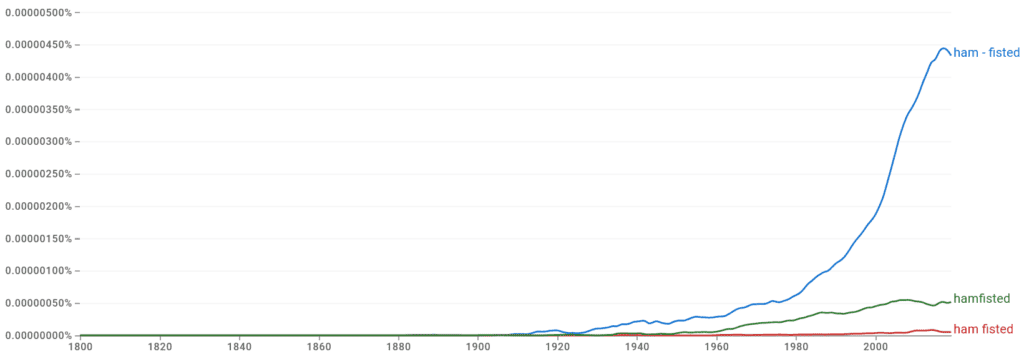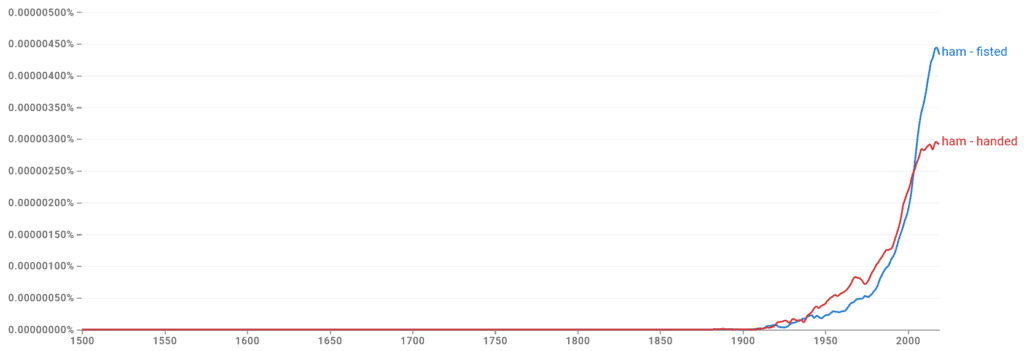Ham-fisted means someone is clumsy or not very skilled at a task, especially in situations where carefulness or skill is important. There’s another similar term you might have heard: ham-handed. Wondering if there’s a difference between the two? Actually, no! They mean the same thing and can be used interchangeably.
Imagine saying someone is ham-fisted at dancing—it means they might not have the best moves on the dance floor. This kind of phrase is called an idiom, which is a special way we use words in English to express something different from their actual meaning. Using idioms correctly adds flair to our speech and helps us sound more natural. So, before you trip over your words, dive into this guide and get a grip on its meaning, origin, and how to use it and its twin with ease!
Ham-fisted Meaning Explained
When someone is described as ham-fisted, it means they’re super clumsy, awkward, or lacking in an important skill for a particular task. If you’re trying to fix a tiny piece of machinery or have a nuanced conversation about politics, being ham-fisted would mean you’re not doing a very good job at it.
Personally, I’m great at writing, but I’m ham-fisted when it comes to speaking. Writing comes so naturally, but if I have an author event or book signing to do, I have to practice my conversation skills and public speaking, or I’ll be stammering all over the place.
My husband actually calls me ham hands all the time, making fun of my constant typos in text messages and stating that my hands and fingers are big and clunky.
Hamfisted vs. Ham Fisted vs. Ham-fisted: Which Is Correct?
Although you might see variations, the most widely accepted form of the adjective is ham-fisted, with a hyphen. It’s the standard spelling that you’ll find in most dictionaries, so it’s best to stick with that.
Ham-fisted Origin and Etymology
The term ham-fisted originated sometime in the 1800s when having large, clumsy hands was compared to the look of large hams. It grew in popularity during the early 20th century and is often used to describe lackluster skill in various domains, from mechanics to social interaction.
One of the first published instances of the term was back in 1904 in the Old Schenectady:
Sir William had in his employ a large, ham-fisted Irishman named McCarthy, who was noted as the “champeen” bare-knuckle fighter of western New York.
Synonyms for Ham-fisted
- Clumsy
- Inept
- Bumbling
- Ham hands
- Unskilled
- Awkward
Using Ham-fisted in a Sentence
- He was so ham-fisted that he broke the vase just by picking it up.
- Her ham-fisted attempts at cooking resulted in a kitchen disaster.
- The politician’s ham-fisted speech did more harm than good.
- I tried to fix my computer, but I was too ham-fisted to manage it.
- Her ham-fisted handling of the situation made things worse.
- He’s a brilliant scientist but utterly ham-fisted when it comes to social interactions.
- The director’s ham-fisted approach ruined the subtle nuances of the script.
- The waiter was so ham-fisted that he spilled water on three different tables.
- The company’s ham-fisted management led to its downfall.
- Her ham-fisted makeup skills made her look like a clown.
Get Your Ham-fisted Mitts on Better Vocabulary
So there you have it, folks! (Sorry, all I can think of is Porky Pig). If you’ve been ham-fisting your way through the vast world of idioms, consider this your exit ticket. Try using ham-fisted in your next conversation and see how it feels. In the meantime, go stock up on some more awesome idioms like this one right on our site.
Enjoyed reading about this idiom? Check out some others we covered:




